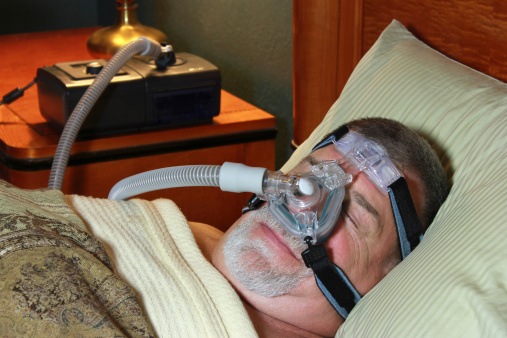
The use of continuous positive airway pressure (CPAP) can significantly improve symptoms of depression in patients with co-existing obstructive sleep apnea (OSA) and cardiovascular disease (CVD), according to the findings of a study published in The Lancet.
Researchers of this study conducted a secondary analysis of over 2,400 patients with moderate-to- severe OSA from the Sleep Apnea Cardiovascular Endpoints (SAVE) cohort, which was an international, multi-center, randomized, open, blinded outcome assessed control trial that evaluated the efficacy of CPAP for OSA in the secondary prevention of CVD. The SAVE study was conducted between December 2008 and November 2013. Eligible patients were randomized to receive either CPAP therapy in conjunction with usual care, or usual care only. Patient data were classified by site, type of CV disease (cardiac, cerebrovascular, or both), and severity of daytime sleepiness. The researchers assessed anxiety and depression symptoms both at baseline, and at intervals of 6-,24-,48-,72-, and 84-month visits utilizing the Hospital Anxiety and Depression Scale (HADS). Moreover, they conducted a systematic review of 20 randomized trials which comprised 4,255 participants.
CPAP Reduces Depression, Not Anxiety
According to the study findings, the use of CPAP therapy was linked with reduced odds of depression cases (adjusted OR= 0·80, 95% CI 0·65 to 0·98, P = 0·031) when juxtaposed to usual care in the SAVE trial and the treatment efficacy was higher in those with pre-existing depression symptoms. Furthermore, the systematic results substantiated the confirmed benefit of CPAP in reducing depression symptoms in OSA patients. “After following them for an average of 3.7 years, we found that CPAP provided significant reductions in depression symptoms compared with those who were not treated for OSA. The improvement for depression was apparent within six months and was sustained,” said Dr. Danni Zheng, from the George Institute for Global Health, and the study’s first author in a press release about the study.
CPAP provides relief from depression #Mentalhealth #depression #health https://t.co/cXZF6DkX59
— Harpreet Duggal, MD (@HDuggalMD) July 1, 2019
In discussing their findings, the researchers continued by writing that while CPAP effectively mitigated symptoms of depression, it had no discernible impact on relieving anxiety. “Our systematic review and meta-analysis confirmed the efficacy of CPAP in reducing depression but not anxiety symptoms. The overall neutral effect of CPAP treatment on anxiety symptoms may be due to a slight positive, albeit non-significant effect of sham-CPAP as compared to therapeutic CPAP in several included trials.”
Overall, they concluded that their “detailed analysis of the SAVE study has shown that CPAP for moderate–severe OSA in patients with CV disease has broader benefits in terms of preventing depression caseness, independent of improved sleepiness. Our additional systematic review provides further support of the treatment effect of CPAP for depression, but not for anxiety symptoms.”
CPAP provides relief from #depression https://t.co/iikTEKpdd1
— Pete Vernig, PhD, MBA (@drvernig) July 2, 2019
CPAP provides relief from depression https://t.co/LgKZLdYkPK
— Bioengineer.org (@bioengineerorg) July 5, 2019
Source: The Lancet, EurekAlert







 © 2025 Mashup Media, LLC, a Formedics Property. All Rights Reserved.
© 2025 Mashup Media, LLC, a Formedics Property. All Rights Reserved.